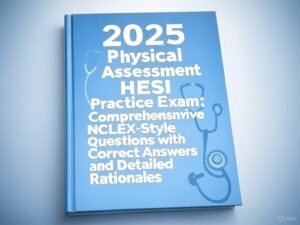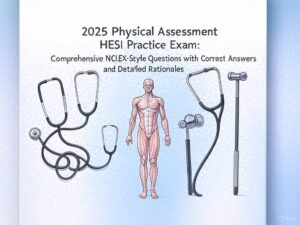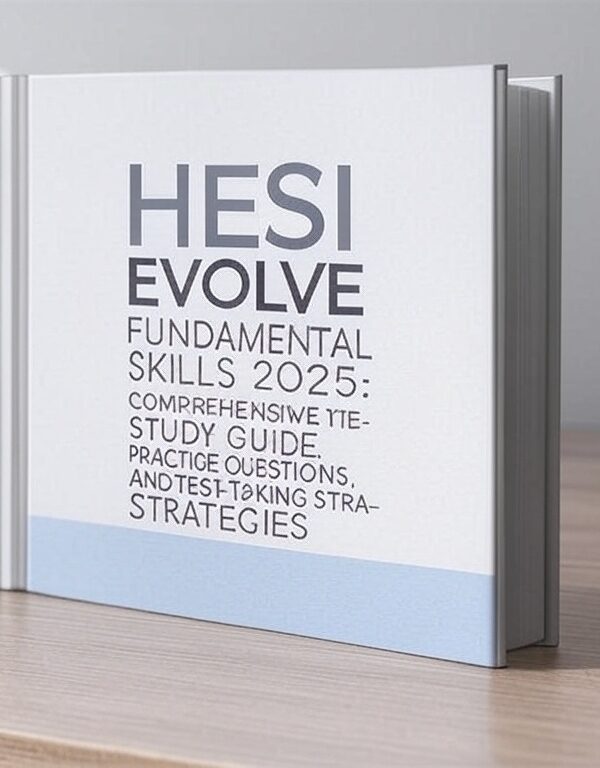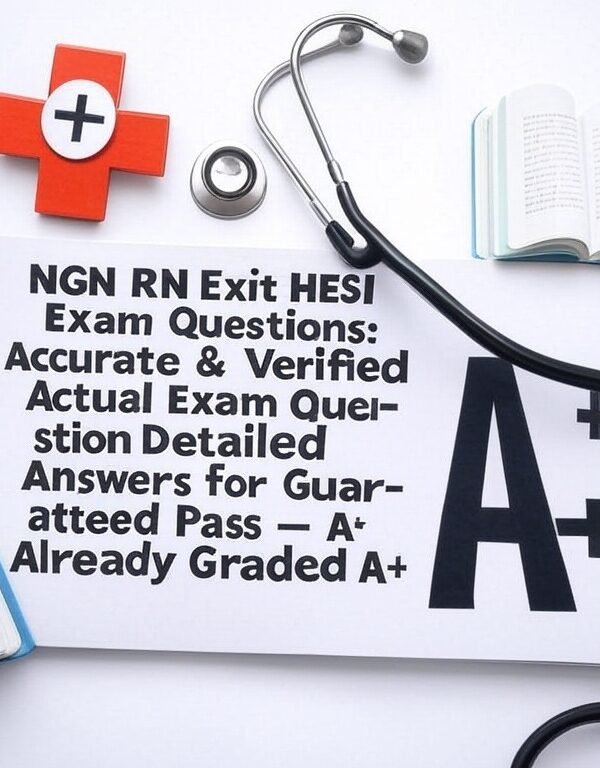Ace your HESI and NCLEX exams with the 2025 Physical Assessment HESI Practice Exam: Comprehensive NCLEX-Style Questions with Correct Answers and Detailed Rationales! Tailored for nursing students, this guide offers a robust collection of NCLEX-style questions focused on physical assessment skills. Each question is paired with correct answers and in-depth rationales to enhance your understanding and critical thinking. Perfect for mastering the 2025 HESI exam, it covers essential topics like inspection, palpation, percussion, and auscultation, ensuring you’re ready for real-world clinical scenarios.
Key features include:
-
NCLEX-Style Questions: Practice with questions mirroring the HESI and NCLEX format.
-
Detailed Rationales: Learn the “why” behind each answer to deepen your knowledge.
-
Comprehensive Coverage: Focuses on physical assessment techniques critical for nursing exams.
-
Exam-Ready Prep: Aligns with the 2025 HESI test plan for targeted preparation.
-
Skill-Building Focus: Strengthens your ability to perform accurate patient assessments.
Prepare smarter and boost your confidence for the 2025 HESI Physical Assessment Exam with this essential study tool!
Preeview
1. Which equipment should the RN instruct the client to use at home for
chronic hypertension management? a. Exercise bicycle b.
Sphygmomanometer
c. Blood glucose monitor
d. Weekly medication box
Correct Answer: b. Sphygmomanometer
Rationale: A sphygmomanometer is used to measure blood pressure, which is
essential in managing hypertension.
2. Which assessment finding indicates a complication of immobility in a
bedridden client? a. Decreased pedal pulses b. Edema in upper extremities
c. Loss of appetite for food
d. Stiffness in right ankle joint
Correct Answer: d. Stiffness in right ankle joint
Rationale: Joint stiffness indicates decreased mobility and is a common complication
of prolonged immobility.
3. Which cultural issues should the RN assess when preparing a client with TB for
discharge? (Select all that apply.) a. Native language b. Education level
c. Type of lifestyle
d. Financial resources
e. Previous medical history
Correct Answers: a, b, c
Rationale: Understanding the client’s native language, education, and lifestyle helps
tailor education and treatment adherence.
4. Which lab value is expected to be elevated in a client with acute
pancreatitis? a. Triglycerides b. Amylase
c. Creatinine
d. Uric acid
Correct Answer: b. Amylase
Rationale: Amylase is an enzyme elevated in acute pancreatitis due to pancreatic cell
damage.
chronic hypertension management? a. Exercise bicycle b.
Sphygmomanometer
c. Blood glucose monitor
d. Weekly medication box
Correct Answer: b. Sphygmomanometer
Rationale: A sphygmomanometer is used to measure blood pressure, which is
essential in managing hypertension.
2. Which assessment finding indicates a complication of immobility in a
bedridden client? a. Decreased pedal pulses b. Edema in upper extremities
c. Loss of appetite for food
d. Stiffness in right ankle joint
Correct Answer: d. Stiffness in right ankle joint
Rationale: Joint stiffness indicates decreased mobility and is a common complication
of prolonged immobility.
3. Which cultural issues should the RN assess when preparing a client with TB for
discharge? (Select all that apply.) a. Native language b. Education level
c. Type of lifestyle
d. Financial resources
e. Previous medical history
Correct Answers: a, b, c
Rationale: Understanding the client’s native language, education, and lifestyle helps
tailor education and treatment adherence.
4. Which lab value is expected to be elevated in a client with acute
pancreatitis? a. Triglycerides b. Amylase
c. Creatinine
d. Uric acid
Correct Answer: b. Amylase
Rationale: Amylase is an enzyme elevated in acute pancreatitis due to pancreatic cell
damage.












Reviews
There are no reviews yet.